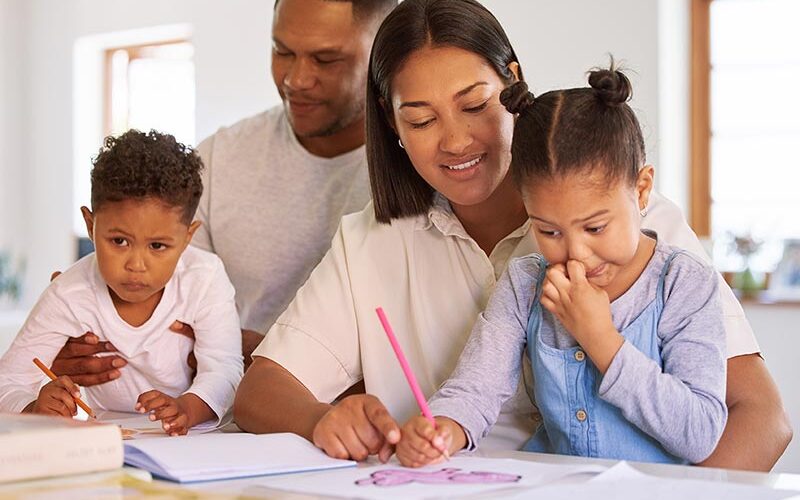In recent years, the parenting style known as ‘intensive parenting’ has gained traction, sparking debate among parents, educators, and psychologists. This approach, characterized by a highly involved and structured style of child-rearing, emphasizes a deep commitment to actively shaping every aspect of a child’s life.
While some argue that this method fosters a nurturing, enriched environment conducive to successful development, others caution against its potential overbearing nature and stress-inducing effects.
This blog post delves into the complexities of intensive parenting, weighing its pros and cons, and offering insights for parents navigating this challenging terrain.
What is Intensive Parenting?
Intensive parenting is a term coined to describe a child-rearing approach where parents are profoundly invested in their children’s lives. This involvement includes constant supervision, structured activities, and a strong emphasis on academic and extracurricular achievement.
Parents who adopt this style often go to great lengths to provide what they believe are the best opportunities for their children, from enrolling them in various classes to closely monitoring their social interactions.
The Pros of Intensive Parenting
- Fostering a Rich Learning Environment: By providing children with diverse experiences and educational opportunities, intensive parenting can stimulate intellectual growth and encourage a love for learning.
- Close Parent-Child Bonds: This style often results in strong, deep connections between parents and children due to the amount of time spent together and the level of parental involvement.
- Preparation for Competitive World: In a world increasingly defined by competition, children raised in intensive parenting environments may be better equipped to excel academically and professionally.
The Cons of Intensive Parenting
- High Stress for Both Parents and Children: The constant pressure to perform and excel can be overwhelming, leading to anxiety and burnout in both children and parents.
- Limited Independence for Children: Over-involvement can hinder a child’s ability to develop independence and problem-solving skills, crucial components of personal development.
- Potential for Strained Relationships: The intense focus on achievement and structured schedules can strain the parent-child relationship, especially if children feel they cannot meet their parents’ high expectations.
Finding a Balance
The key to effective parenting, regardless of style, lies in balance. Here are some tips for parents considering or currently practicing intensive parenting:
- Prioritize Child’s Well-being Over Achievement: Remember that a child’s emotional and mental health is just as important as their academic or extracurricular success.
- Allow Room for Independence: Gradually giving children more responsibility and freedom to make choices helps them develop essential life skills.
- Be Mindful of Your Own Stress Levels: Parents should be aware of their stress and avoid projecting it onto their children. Practicing self-care is crucial.
- Open Communication: Maintain an open dialogue with your child, ensuring that they feel comfortable sharing their thoughts and feelings.
- Adaptability: Be prepared to adjust your parenting style as your child grows and their needs change.
Conclusion
Intensive parenting, while well-intentioned, is a complex and often controversial approach. Its effectiveness largely depends on the individual child and the family dynamic. What is crucial, however, is ensuring that the child’s overall well-being remains at the forefront of any parenting approach.
By striking a balance between involvement and independence, parents can foster an environment where children feel supported yet free to explore, learn, and grow on their own terms.
FAQs on Intensive Parenting
Q: What exactly is intensive parenting?
A: Intensive parenting is a highly involved approach to child-rearing. It emphasizes a deep commitment from parents in overseeing and participating in various aspects of their children’s lives, including education, extracurricular activities, and social interactions.
Q: How does intensive parenting differ from other parenting styles?
A: Unlike more relaxed parenting styles, intensive parenting involves a higher degree of planning, scheduling, and active participation in a child’s development. It’s more structured and goal-oriented, focusing on actively shaping various aspects of the child’s life.
Q: What are the main benefits of intensive parenting?
A: Intensive parenting can lead to children achieving high academic and extracurricular success, developing strong parent-child bonds, and being well-prepared for the competitive aspects of adult life.
Q: Are there any drawbacks to intensive parenting?
A: This approach can sometimes result in high stress levels for both parents and children, hinder the child’s independence and problem-solving skills, and potentially strain the parent-child relationship.
Q: How can I tell if I’m an intensive parent?
A: If you find yourself heavily involved in most aspects of your child’s life, from academic to social, and often managing their schedule with a focus on achievement and success, you might be practicing intensive parenting.
Q: Can intensive parenting harm a child?
A: If not balanced properly, it can lead to issues like anxiety, burnout, and decreased self-esteem in children, especially if they feel they can’t meet high parental expectations.
Q: How can I balance intensive parenting to avoid negative effects?
A: Balance can be achieved by prioritizing your child’s emotional well-being, allowing them room for independence, maintaining open communication, and being adaptable to their changing needs.
Q: Is intensive parenting more effective than other styles?
A: Effectiveness varies depending on the child’s personality, family dynamics, and cultural context. No one style is universally ‘best’, and what works for one child may not work for another.
Q: How does intensive parenting affect a child’s social skills?
A: It can sometimes limit a child’s opportunity to develop social skills independently, especially if the parents are overly involved in managing their social interactions.
Q: Can intensive parenting be adapted as a child grows older?
A: Absolutely. As children grow, it’s important to adapt your parenting style to allow for more independence and decision-making, helping them transition into adulthood.



